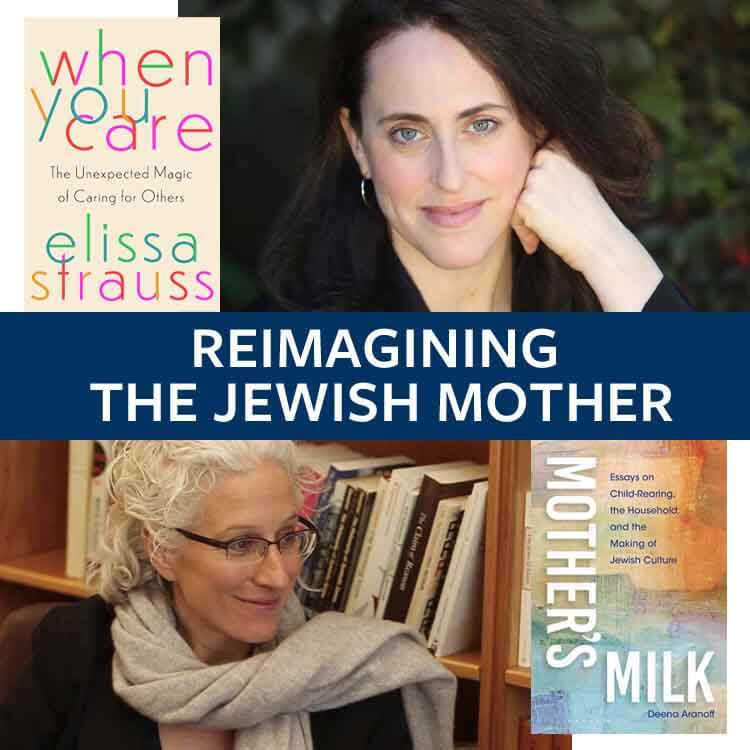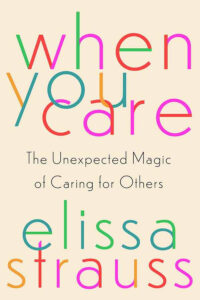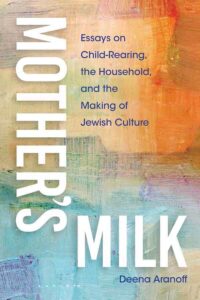Author Panel
Reimaging the Jewish Mother

Featuring Elissa Strauss and Deena Aranoff in conversation
11:00am | Helzel Study Room
Jewish Arts and Bookfest
Sunday, May 4, 2025
at UC Berkeley’s Magnes Collection of Jewish Art and Life, 2121 Allston Way, Berkeley, CA
Join writers Elissa Strauss and Deena Aranoff as they examine the power and depth of Jewish motherhood, rejecting old misogynistic stereotypes and elevating mothers to a place of respect and profound curiosity they have long deserved. They’ll discuss the worrying, the kvelling, the feeding, and those encounters with the divine that happen when caring for children.
About Elissa Strauss
Elissa Strauss is a journalist, essayist and cultural critic who has been writing about the politics and culture of parenting and caregiving for more than fifteen years. Her work appears in publications like the Atlantic, the New York Times, Glamour, ELLE, and elsewhere, and she was a former contributing writer at CNN.com and Slate. Her book, “When You Care: The Unexpected Magic of Caring for Others,” is out now from Gallery Books.
In addition to writing, she is a curator, speaker and artistic director of LABA: A Laboratory for Jewish Culture.
Photo credit: Laura Turbow Photography
 When You Care: The Unexpected Magic of Caring for Others
When You Care: The Unexpected Magic of Caring for Others
Behind our current caregiving crisis, in which a broken system has left parents and caregivers exhausted, sits a fierce addiction to independence. But what would happen if we started to appreciate dependency, and the deep meaning of one person caring for another? If we start to care about care?
Drawing on research into parenting and caregiving, as well as her own experiences as a mother, journalist Elissa Strauss delves into the history and power of care in our lives and communities. With a curiosity and desire to more fully understand one of humanity’s most profound and essential relationships, she interrogates our societal obsession with going it alone, and poses a challenge to let ourselves be transformed by the act of
When You Care weaves historical anecdotes and science with conversations with parents and caregivers to the young, old, disabled, ill, and more, revealing a rich array of insights about how care shapes us on the inside and the outside, for the better. Care is a long-ignored force in our collective and political lives, as well as a deeply philosophical, spiritual and psychologically potent experience. More so, an embrace of care by both women and men will lead to a more gender equitable future, and help us reimagine what it means to be productive and live a meaningful life.
The result is an eye-opening exploration into the power of being depended on—and a stirring call to action to finally acknowledge the breadth, depth and beauty of all that caregivers do.
About Deena Aranoff
Deena Aranoff is Faculty Director of the Richard S. Dinner Center for Jewish Studies at the Graduate Theological Union in Berkeley, CA. She teaches rabbinic literature, medieval patterns of Jewish thought, and the broader dynamics of change and constancy in Jewish history. Her recent publications engage with the subjects of childcare, household life, and the making of Jewish culture.
 Mother’s Milk: Essays on Child-Rearing, the Household, and the Making of Jewish Culture
Mother’s Milk: Essays on Child-Rearing, the Household, and the Making of Jewish Culture
Currently on pre-order, Mother’s Milk: Essays on Child-Rearing, the Household, and the Making of Jewish Culture (Indiana University Press, September 2025) engages with an age-old question: What accounts for the persistence of Jewish culture through the ages? Despite significant variations, how were Jewish cultural elements sustained over the millennia?
Mother’s Milk proposes that we include the earliest phases of child-rearing in the history of Jewish cultural production. Author Deena Aranoff argues that some of the most enduring aspects of Jewish culture are produced in the context of household and family relations.
The collection of essays examine how Jewish practices, including rabbinic halakhah, are derived from household custom and unfold within the context of family life. Aranoff proposes a revised genealogy of Jewish culture that emphasizes the interplay between everyday life and formal Jewish practice.
